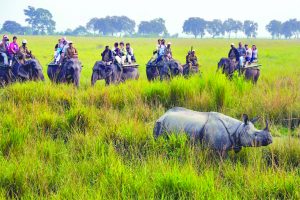 Assam attracts tourists, research scholars and scientists from different parts of the globe for various reasons, but one major destination is undoubtedly Kaziranga National Park. Known as a safe haven for greater one-horned rhinoceros, the world famous forest reserve however invites bad names as well, primarily for relentless poaching of wildlife and lately atrocities over tribal people in its fringe localities.
Assam attracts tourists, research scholars and scientists from different parts of the globe for various reasons, but one major destination is undoubtedly Kaziranga National Park. Known as a safe haven for greater one-horned rhinoceros, the world famous forest reserve however invites bad names as well, primarily for relentless poaching of wildlife and lately atrocities over tribal people in its fringe localities.
Known as a success story in the history of wildlife conservation in India, Kaziranga lately got shocking news as a tribal peoples’ rights body had come out with a boycott call against the park claiming that it has turned into a killing field of innocent tribal people in the name of conservation. Survival International, the London based tribal rights organization issued the statement expressing its concern that the forest guards of Kaziranga were using extreme power with impunity to kill poachers to safeguard the precious single-horn rhinos. What was shocking, the international organization asserted that many tribal people were also killed by the armed forest guards with mere suspicion.
There were few people to listen to the Survival at that time, as the Kaziranga authority continued celebrating the success story of preserving almost two thirds of world one-horned rhino population. Besides rhinos, the central Assam based forest reserve, lately developed as a tiger project too, gives shelter to a significant number of Royal Bengal tigers, Asiatic elephants & buffalos, different species of deer etc.
The rhinos are identified as vulnerable by the International Union for Conservation of Nature (IUCN) in its 2008 red list. Earlier in 1986, the animal was categorized as endangered. Poachers continue killing the rhinos for the horns that carry a huge sum of money in the international market feeding the demand for traditional Chinese and
Vietnamese medicinal uses.
Spreading across over 800 sq km on the south bank of mighty river Brahmaputra and classified as a UNESCO world heritage site, the park presently gives shelter to nearly 2500 rhinos and the authority is hopeful of achieving the target of 3,000 rhinos in Assam by the year 2020.
The issue of killing people in the name wildlife conservation gained momentum after the British Broadcasting Corporation (BBC) beamed a news-feature recently, where the journalist Justin Rowlatt interviewed responsible forest officials and frontline guards to justify that they were mentally prepared to kill anyone unwanted inside the Kaziranga territory.
The BBC news feature claimed that since 2013, the armed guards of Kaziranga that hosted UK’s Prince William and Katherine in April 2016, continued killing almost two people per month under the brutal conservation policy. The year 2015 witnessed the encounter killings of 23 people in Kaziranga in contrast to 18 rhinos poached by the criminals.
Innocent villagers, mostly tribal people, have been caught up in the conflict (between the poachers and forest guards) and the problem is mostly because the park rangers are indiscriminate in applying brutal force, and they are given immunity from prosecution, stated the piece.
“The park has killed, maimed and it is alleged that it even tortured people. There is no question that rhinos should be protected. But at what cost? This is the inside story of an Indian national park and those killed in the name of conservation,” commented the BBC’s South Asian correspondent in the news based program.
Rowlatt also declared that despite his initiative, both the environment ministries in New Delhi and Dispur (responsible for the protection of forest and wildlife), the NTCA (National Tiger Conservation Authority of India) and Assam forest department did not respond to his necessary queries.
Once the BBC aired the program titled ‘Our World: Killing for Conservation’ on 11 February 2017, the government and people of Assam raised serious concern over its content arguing that the Kaziranga guards were legally empowered to take stern actions against the poachers.
Various protection groups came forward scolding the London based news channel for propagating a wrong image to Kaziranga to the international audience. They organized impressive public outcries in favour of the Kaziranga authority to protect the rhinos and other wildlife with all affective means.
Encouraged with the development, the NTCA barred the BBC journalist Rowlatt from filming in any of India’s 50 tiger reserves for five years. Later the Union environment ministry requested the external affairs ministry to revoke the visas of Rowlatt along with his associates who shot the film.
The NTCA claimed that Rowlatt ‘misled government officials into giving permission to film by submitting a false synopsis’. They then went on to produce a documentary which shows Indian conservation efforts in poor light, contrary to the synopsis submitted, asserted the NTCA.
Little bit of unusual, but the NTCA claimed that the BBC and Rowlatt violated four pre-conditions including they filmed (in Kaziranga) after the sunset, did not screen the documentary before a committee of Union environment, forests & climate change ministry and deviated from the original synopsis submitted to the external affairs ministry and the tiger conservation authority.
Barring the BBC from filming in Indian tiger projects was however not a quick-fix solution to the conservation authority. But it tempted the Survival to launch a campaign to boycott the park that attracts over some 150,000 annual visitors including over 11,000 foreign tourists, untill the Kaziranga authority revokes its shoot-on-sight policy.
The tribal rights body argued that over 100 people were killed at Kaziranga in the last 20 years. It also highlighted the case of Akash Orang, a minor tribal boy, who faced bullet injuries by accident from a forest guard in Kaziranga locality in July 2016. Akash received
serious injuries to his legs and is still under treatment. Following the locals’ outcry, the Kaziranga authority suspended two guards.
Besides Akash, there are few more victims of the shoot to kill (rather than to apprehend) policy in Kaziranga itself. The inhuman policy has already attracted severe criticism from conservation charities for encouraging violence, rather than effectively tackling the criminal networks behind the poaching. The Survival statement also added that it was writing to over 130 international tour operators in 10 western countries pursuing their
Kaziranga boycott campaign. Its director Stephen Corry asserted that the Kaziranga authority was practicing the extrajudicial killing for years and they can’t ignore the matter anymore. The local residents living at the periphery of Kaziranga extended moral supports to Rowlatt and demanded the unnecessary ban on the BBC journalist to be lifted immediately. Jeepal Krisak Sramik Sangha (JKSS), a farmer-labourers’ body based in Kaziranga locality, while criticizing Kaziranga’s harsh conservation methods, urged the government to institute a high level probe into the reported deaths of tribal people till date in and around the park.
Recently, the BBC’s Natural History unit wrote to the NTCA expressing its regret for the adverse impact of the report titled highlighting the killings for wildlife conservation in Kaziranga, which was later published in various Indian media outlets. But blaming the concerned unit of the reputed news channel, Survival made it clear that the BBC authority was only trying to row back for getting the permission for filming in Indian forest reserves.
“Contrary to reports in the Indian media, the BBC letter has not cast any doubt whatsoever on the accuracy or truthfulness of the investigation,” said Survival International adding that the BBC authority has not actually admitted its Kaziranga shoot on sight expose was wrong.
But by giving into the diktats of the NTCA, the BBC authority has not only taken an anti-people stand but also failed to uphold the basic values of human rights and media ethics of righteous journalism, asserted the Survival adding that by doing so the news channel was putting the brave locals in the firing line, as someone may use it wrongly to accuse them of defaming India’s reputation.
The author is a Guwahati based journalist and Secretary, Guwahati Press Club.
letters@tehelka.com











